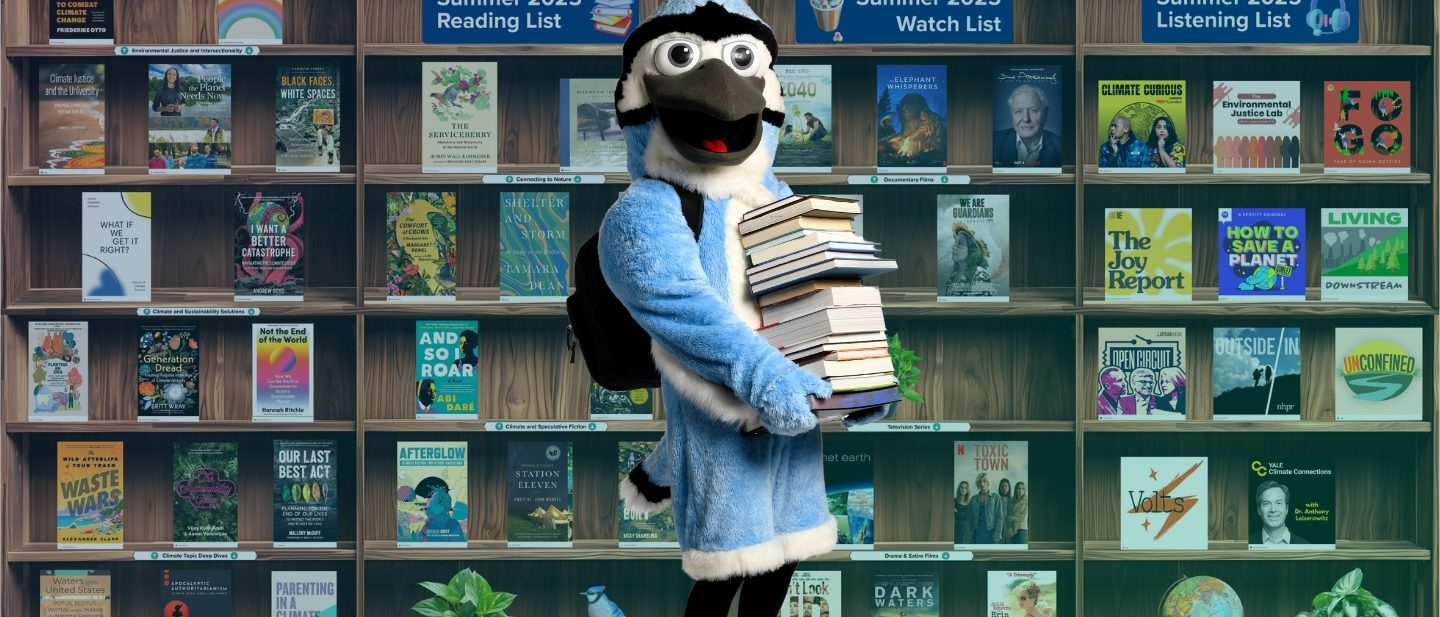
Looking for climate and sustainability related media to add to your summer reading list? Check out some of the Office of Climate and Sustainability’s recommendations for books, podcasts, movies, TV shows, and more to explore, from beach reads to deep dives.
In the spirit of sustainability, consider checking out books or movies from your local library, buying secondhand, or borrowing from a friend!
- In Black Faces, White Spaces: Reimagining the Relationship of African Americans to the Great Outdoors, Dr. Carolyn Finney explores the impacts of racism and slavery on African Americans’ relationship with nature.
- Dr. Friederike Otto’s Climate Injustice: Why We Need to Fight Global Inequality to Combat Climate Change “shows how racism, colonialism, sexism, and climate change are interconnected, and how positive changes on one level can lead to positive effects on another.”
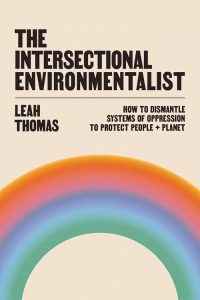 Climate Justice and the University: Shaping a Hopeful Future for All, written by Dr. Jennie C. Stephens, looks at the powerful role that higher education institutions can play in advancing transformative climate justice.
Climate Justice and the University: Shaping a Hopeful Future for All, written by Dr. Jennie C. Stephens, looks at the powerful role that higher education institutions can play in advancing transformative climate justice. - Written by intersectional environmental activist and eco-communicator Leah Thomas with excerpts from over 20 activists and educators, The Intersectional Environmentalist “examines the inextricable link between environmentalism, racism, and privilege, and promotes awareness of the fundamental truth that we cannot save the planet without uplifting the voices of its people – especially those most often unheard.”
- In People the Planet Needs Now: Voices for Justice, Science, and a Future of Promise, photographer and author Dudley Edmondson compiles personal stories and perspectives from 25 different climate scientists and activists.
- Author, humorist, and climate activist Andrew Boyd interviews eight leading climate thinkers in his effort to deal with climate angst and find solutions, presenting the answers he finds in I Want a Better Catastrophe: Navigating the Climate Crisis with Grief, Hope and Gallows Humor.
- In Generation Dread: Finding Purpose in an Age of Climate Anxiety, Dr. Britt Wray “brilliantly weaves together research, insight from climate-aware therapists, and personal experience, to illuminate how we can connect with others, find purpose, and thrive in a warming, climate-unsettled world.”
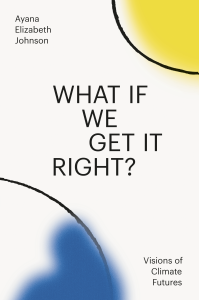 Dr. Hannah Ritchie’s Not the End of the World: How We Can Be the First Generation to Build a Sustainable Planet offers a data-driven exploration of the climate crisis, the progress that’s been made, and the solutions that are available.
Dr. Hannah Ritchie’s Not the End of the World: How We Can Be the First Generation to Build a Sustainable Planet offers a data-driven exploration of the climate crisis, the progress that’s been made, and the solutions that are available.
- Planting an Idea: Critical and Creative Thinking About Environmental Issues – co-written by Dr. Jerry Apps, professor emeritus and former county extension agent, and Natasha Kassulke, communicator and former journalist – is “part guidebook for better critical and creative thinking and part overview of the environmental challenges that face our planet today.”
- “Through clear-eyed essays and vibrant conversations, infused with data, poetry, and art,” Dr. Ayana Elizaberth Johnson’s What If We Get It Right? Visions of Climate Futures “guides us through solutions and possibilities at the nexus of science, policy, culture, and justice.”
- Apocalyptic Authoritarianism: Climate Crisis, Media, and Power, by Dr. Hanna E. Morris, analyzes “the complex intersection of climate journalism and politics in an age of increasing polarization, nationalism, and social unease.”
- The Lost Trees of Willow Avenue: A Story of Climate and Hope on One American Street, by author and activist Mike Tidwell, presents a “riveting and elegant story of climate change on one city street, full of surprises and true stories of human struggle and dying local trees – all against the national backdrop of 2023’s record heat domes and raging wildfires and, simultaneously, rising hopes for clean energy.”
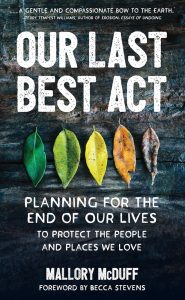 Educator and environmentalist Mallory McDuff’s Our Last Best Act: Planning for the End of Our Lives to Protect the People and Places We Love explores “how it’s possible for our death to honor our values, create a sustainable legacy, and help to heal the earth.”
Educator and environmentalist Mallory McDuff’s Our Last Best Act: Planning for the End of Our Lives to Protect the People and Places We Love explores “how it’s possible for our death to honor our values, create a sustainable legacy, and help to heal the earth.” - In Parenting in a Climate Crisis: A Handbook for Turning Fear into Action, environmental journalist and parent Bridget Shirvell offers parents advice on “how to navigate the uncertainty of the climate crisis and keep your kids informed, accountable, and hopeful – with simple actions you can take as a family to help the earth.”
- The Sustainability Class: How to Take Back Our Future from Lifestyle Environmentalists, by Dr. Vijay Kolinjivadi and Aaron Vansintjan, argues that the topic of environmental sustainability has been co-opted by the urban elites and presents real-world solutions to the climate crisis.
- Investigative journalist Alexander Clapp’s Waste Wars: The Wild Afterlife of Your Trash exposes “the catastrophic reality of the multi-billion-dollar global garbage trade.”
- Waters of the United States: POTUS, SCOTUS, WOTUS, and the Politics of a National Resource, by Royal C. Gardner, JD, details the history and politics of water policy in the United States.
- In Close to Home: The Wonders of Nature Just Outside Your Door, Dr. Thor Hanson encourages readers to connect to the natural world all around them and “shows that we each can contribute to science and improve the health of our planet.”
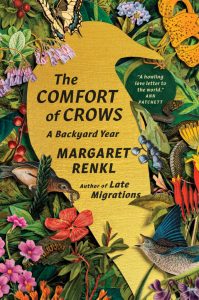 Writer Margaret Renkl’s The Comfort of Crows: A Backyard Year follows the changing seasons in her backyard and the shifting climate impacting the plants and creatures there.
Writer Margaret Renkl’s The Comfort of Crows: A Backyard Year follows the changing seasons in her backyard and the shifting climate impacting the plants and creatures there. - Ecologist Tom Wessels explains how to notice the features of the natural landscape and interpret the history of the land in Reading the Forested Landscape: A Natural History of New England.
- In The Serviceberry: Abundance and Reciprocity in the Natural World, Dr. Robin Wall Kimmerer offers “a bold and inspiring vision for how to orient our lives around gratitude, reciprocity, and community, based on the lessons of the natural world.”
- Shelter and Storm: At Home in the Driftless, by writer Tamara Dean, “illuminates a thoughtful way forward for anyone concerned about climate change and its far-reaching consequences or for anyone searching, as Dean has, for a more sustainable way to live.”
- Edited by Grist, a nonprofit media organization dedicated to telling stories of climate solutions, Afterglow: Climate Fiction for Future Ancestors “is a stunning collection of original short stories in which writers from many different backgrounds envision a radically different climate future.”
- The sequel to Abi Daré’s The Girl with the Louding Voice, And So I Roar – winner of the inaugural Climate Fiction Prize 2025 – “follows fourteen-year-old Adunni from her life in Lagos, where she is excited to finally enrol in school, to her home village where she is summoned to face charges for events that are in fact caused by climate change.”
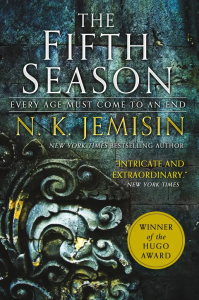 N.K. Jemisin’s The Fifth Season follows a woman attempting to find her kidnapped daughter and hide her secret power, set in a world with a dangerously volatile environment whose latest near-extinction event appears to be kicking off.
N.K. Jemisin’s The Fifth Season follows a woman attempting to find her kidnapped daughter and hide her secret power, set in a world with a dangerously volatile environment whose latest near-extinction event appears to be kicking off. - A Psalm for the Wild-Built, by Becky Chambers, presents a world where humanity shifted to more sustainable and slower lifestyles after robots gained self-awareness and disappeared centuries ago, and asks: “in a world where people have what they want, does having more matter?”
- In Emily St. John Mandel’s Station Eleven, a troupe of actors and musicians “have dedicated themselves to keeping the remnants of art and humanity alive” after a pandemic caused civilization as we know it to collapse.
- 2040 – “Motivated by concerns about the planet his 4-year-old daughter would inherit, filmmaker Damon Gameau embarked on a global journey to meet innovators and change makers in the areas of economics, technology, civil society, agriculture, education and sustainability.”
- The Elephant Whisperers centers on a couple in South India who “devote their lives to caring for an orphaned baby elephant named Raghu, forging a family like no other that tests the barrier between the human and the animal world.”
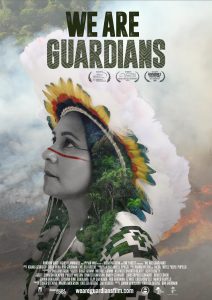 In David Attenborough: A Life on Our Planet, naturalist Attenborough reflects on his own life, the evolutionary history of life on Earth, and the impact of humanity on nature, and presents ways to combat climate change and prevent biodiversity loss.
In David Attenborough: A Life on Our Planet, naturalist Attenborough reflects on his own life, the evolutionary history of life on Earth, and the impact of humanity on nature, and presents ways to combat climate change and prevent biodiversity loss.
- Kiss the Ground highlights the potential for regenerative agriculture to improve soil health and draw down atmospheric carbon.
- We Are Guardians, co-directed by Rob Grabman KSAS ‘11, Chelsea Greene, and Edivan Guajajara, highlights communities in Brazil fighting deforestation and attempting to protect their way of life.
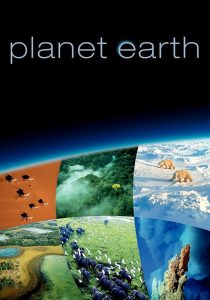 The BBC’s Planet Earth presents in-depth nature documentaries highlighting different habitats across the globe.
The BBC’s Planet Earth presents in-depth nature documentaries highlighting different habitats across the globe.
- Toxic Town is a drama miniseries depicting the true story of the Corby toxic waste caste, in which families in the town of Corby, England, brought a case against the Corby Borough Council for environmental pollution and resulting birth defects caused by the Council’s efforts to clean up toxic waste from a closed steelworks.
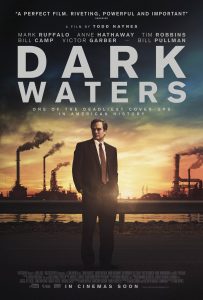 Based on a true story, Dark Waters is a legal thriller depicting Robert Bilott’s case against DuPont for chemical contamination and coverup in Parkersburg, West Virginia.
Based on a true story, Dark Waters is a legal thriller depicting Robert Bilott’s case against DuPont for chemical contamination and coverup in Parkersburg, West Virginia.
- In the satirical film Don’t Look Up, two astronomers try to warn humanity about a comet that will destroy civilization; the story is an allegory for climate change and indifference to the crisis.
- The movie Erin Brockovich dramatizes the true story of a lawyer who built a case against Pacific Gas & Electric Company (PG&E) for pollution that impacted residents of the town of Hinkley, California.
- The Environmental Justice Lab
 with Dr. Lesley Joseph, P.E., examines “issues related to environmental justice and the ways in which communities of color are impacted.”
with Dr. Lesley Joseph, P.E., examines “issues related to environmental justice and the ways in which communities of color are impacted.”
- Living Downstream, presented by Northern California Public Media (NCPM) “explores environmental justice in communities from California to Indonesia and is hosted by NCPM News Director Steve Mencher.”
- Climate Curious, from TEDxLondon and hosts Maryam Pasha and Ben Hurst, aims to “lift the lid on the climate emergency by speaking to the world’s leading and most relatable climate pioneers. Find out why cities are key to the climate fight, why we need to tackle systemic problems (and not just plastic straws), and why we’re all a bit crap at sustainability.”
- How to Save a Planet,
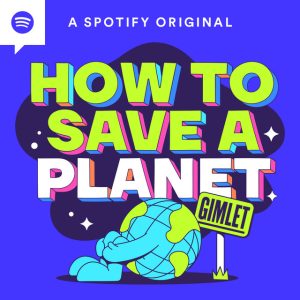 hosted by journalist Alex Blumberg, offers “smart, inspiring stories about the mess we’re in and how we can get ourselves out of it.”
hosted by journalist Alex Blumberg, offers “smart, inspiring stories about the mess we’re in and how we can get ourselves out of it.”
- See also: What If We Get It Right?, a new podcast exploring climate solutions from former “How to Save a Planet” host Dr. Ayana Elizabeth Johnson.
- The Joy Report, hosted by Arielle King and produced by Intersectional Environmentalist, is a show “dedicated to sharing stories about climate solutions and environmental justice grounded in intersectionality and optimism.”
-
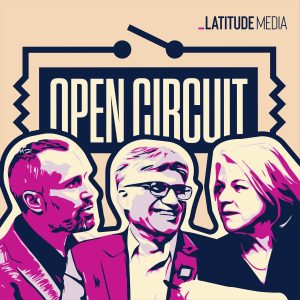
1.90.3-2ZUDTJZ62Y53WSH6X4QWX3DQEY.0.1-5 In Open Circuit, produced by Latitude Media, energy industry veterans Jigar Shah, Katherine Hamilton, and Stephen Lacey “explain the forces accelerating the energy transition – from technological leaps and supply chain shifts, to market upheavals and policy breakthroughs.”
- Unconfined, produced by the Johns Hopkins Center for a Livable Future, explores the public health impacts of food animal production – check out their most recent episode, “The land owns us“ (5/27/2025).
- Volts “is a podcast about leaving fossil fuels behind,” from veteran energy reporter David Roberts, who talks with “politicians, analysts, innovators, and activists about the latest progress in the world’s most important fight.”
- Yale Climate Connections releases daily 90-second climate news stories as a podcast and broadcast nationwide on over 750 stations.
- FOGO (Fear of Going Outside)
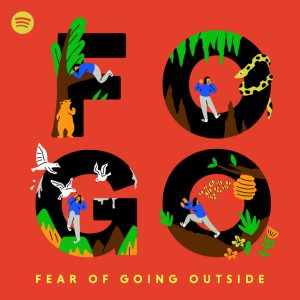 “is a nature show — by the most reluctant host ever. Most nature shows are hosted by reckless white men, but avid indoorswoman Ivy Le is an Asian mom with severe allergies.” In the show’s first season, Le explored camping, and, in the current season, she is braving the outdoors again to try hunting!
“is a nature show — by the most reluctant host ever. Most nature shows are hosted by reckless white men, but avid indoorswoman Ivy Le is an Asian mom with severe allergies.” In the show’s first season, Le explored camping, and, in the current season, she is braving the outdoors again to try hunting!
- Outside/In, from New Hampshire Public Radio, is a show “where curiosity and the natural world collide,” exploring “science, energy, environmentalism, and reflections on how we think about and depict nature.”
- We Are Water Protectors
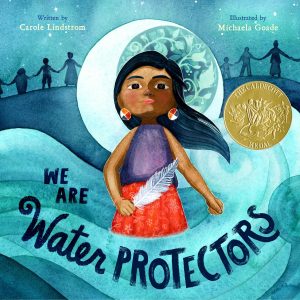 – Carole Lindstrom; illustrated by Michaela Goade (Ages 3-6)
– Carole Lindstrom; illustrated by Michaela Goade (Ages 3-6)
- Something Happened to Our Planet: Kids Tackle the Climate Crisis – Marianne Celano and Marietta Collins; illustrated by Bhagya Madanasinghe (Ages 4-8)
- Life After Whale – Lynn Brunelle; illustrated by Jason Chin (Ages 4-8)
- Our Green City – Tanya Lord Kyi; illustrated by Colleen Lamour (Ages 4-8)
- Saving American Beach: The Biography of African American Environmentalist MaVynee Betsch – Heidi Tyline King; illustrated by Ekua Holmes (Ages 4-8)
- Fatima’s Great Outdoors – Ambreen Tariq; illustrated by Stevie Lewis (Ages 4-8)
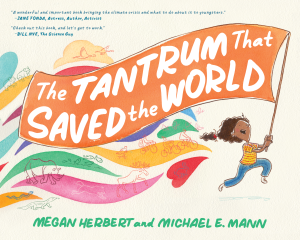 What a Waste: Trash, Recycling, and Protecting our Planet – Jess French (Ages 4-9)
What a Waste: Trash, Recycling, and Protecting our Planet – Jess French (Ages 4-9)
- The Tantrum That Saved the World – Megan Herbert and Michael E. Mann (Ages 5-9)
- Old Enough to Save the Planet – Loll Kirby and Adelina Lirius (Ages 7-10)
- Our World Out of Balance: Understanding Climate Change and What We Can Do – Andrea Minogio and Laura Fanelli (Ages 8-12)
- Plastic Sucks! How YOU Can Reduce Single-Use Plastic and Save Our Planet – Dougie Poynter (Ages 8-12)
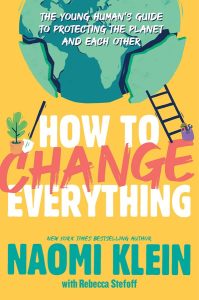 The First Rule of Climate Club – Carrie Firestone (Ages 8-12)
The First Rule of Climate Club – Carrie Firestone (Ages 8-12)
- Saving Earth: Climate Change and the Fight for Our Future – Olugbemisola Rhuday-Perkovich and Tim Foley (Ages 10-14)
- How to Change Everything: The Young Human’s Guide to Protecting the Planet and Each Other – Naomi Klein, with Rebecca Stefoff (Ages 10+)
- All the Feelings under the Sun: How to Deal with Climate Change – Leslie Davenport; illustrated by Jessica Smith (Ages 11-14)